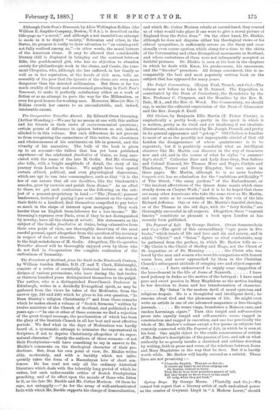Although Unele , 2'ont's Tenement, by Alice Wellington Rollins (the William E.
Smythe Company, Boston, U.S.A.), is described on the title-page as " a,novel," and although a not unambitious attempt is made in it to depict "society-," Bohemian and other, in the States, its purpose is really to draw attention to "an existing evil not fully realised among us,"—in other words, the moral horrors of the American slums. It may be allowed that considerable literary skill is displayed in bringing out the contrast between Effie/ the good-hearted girl, who has no objection to abandon society for philanthropic work in the slums, and Cassie, the tene- ment Cleopatra, who, although she has suffered, in her family as well as in her reputation, at the hands of rich men, tells an assembly of the poor that the tyrants of the slums are even more dangerous than the detested millionaires. But there is far too much crudity of theory and overstrained preaching in Uncle Tom's Tenement, to make it perfectly satisfactory either as a work of fiction or as an attempt to pave the way for the Millennium, or even for good houses for working men. Moreover, Miss (or Mrs. ?) Rollins crowds her canvas to an uncomfortable, and, indeed, intolerable extent.


































 Previous page
Previous page